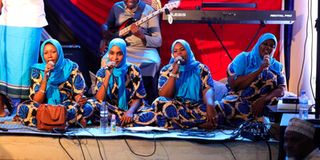How to make our country a Kiswahili powerhouse

Anoor Band performs in Lamu Town during the World Kiswahili Day celebrations on July 7, 2022. With more than 200 million speakers across the globe, Kiswahili is one of the fastest-rising languages.
With more than 200 million speakers across the globe, Kiswahili is one of the fastest-rising languages. Recently, Uganda's Cabinet approved its adoption as an official language and directed that it become a compulsory subject in primary and secondary schools.
Earlier, the African Union (AU) had approved Kiswahili as a working language and a lingo of communication in Africa.
The revitalised push for Kiswahili to become a lingua franca in Africa could benefit the continent. But that will not be possible without political goodwill from the host nations. The time is ripe to make our African vernacular part of the languages of power. The time to ensure that Kiswahili is well established and strategically placed for trade, diplomacy and communications globally is now.
For Kenya to lead in this incredible prospect of establishing a good foundation for Kiswahili, the region must put basics in place swiftly and effectively. Kiswahili is a national and official language in Kenya. However, its influence is yet to be felt far and wide. Our neo-colonial sentiments have made us believe that it is of the least learned people. You would not be taken seriously in a decorous platform if you expressed yourself in Kiswahili.
Native languages
This lack of identity is apparent when our athletes and diplomats comfortably speak to the international media in English in a forum where Germans and French people use their native languages.
For Kenya to be a Kiswahili powerhouse, we must change our policies, perception and mindset. Kenya Institute of Curriculum Development (KICD), ought to review the curriculum to give it its deserved pride of place. The prejudice escalated by curriculum developers chocks the baby steps it has made so far.
Let Kiswahili be taught from preschool in PP1 and made a compulsory subject up to university. Though one of the core and compulsory subjects up to junior secondary school, Kiswahili is tied with Kenya Sign Language, making it optional. At the senior secondary level, if a student does not pick the Social Sciences Pathway, their interaction with Kiswahili ends.
Incorporate this spirit
Schools must also allow students to articulate themselves in Standard Kiswahili. A school that does not facilitate progress of Kiswahili amongst its learners must be called out. International curriculums must also incorporate this spirit in their learning to help Kiswahili to grow beyond the borders. Let it be one of the common units taught in the early stages of higher learning.
To enrich language tourism, let every foreigner—be it a student or diplomat—resident in Kenya undergo a six-month Kiswahili training to help them acquaint themselves with its culture.
Lastly, the National Kiswahili Council should oversee Kiswahili promotion activities in the country and coordinate its expansion abroad.
Mr Mjomba, a PR practitioner with Niken Marketing & Communications Ltd, is an educationist, motivational speaker and a podcaster with Paukwa Radio. [email protected]. @otienomjomba





